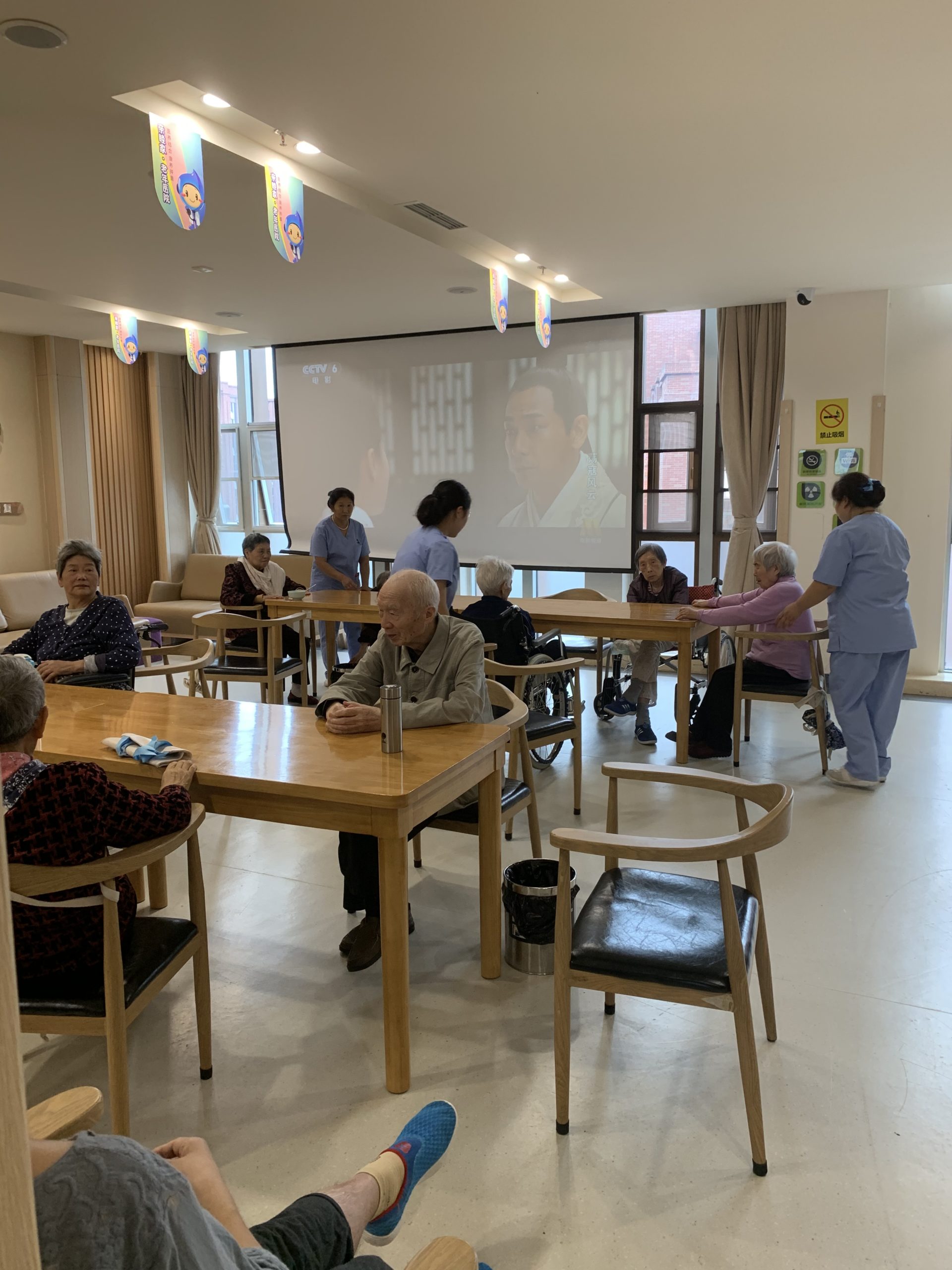Article begins
This piece is part of an SEAA series on “An Anthropology of Ethics in East Asia.” The articles examine how individuals cope with societal changes such as environmental crises, nationalism, economic development, and mobility through lens of everyday ethics.
My conversation with care manager Zhang, the woman supervising the care workers among whom I conducted my fieldwork, came to a halt when she said, “Most care workers are here because they have no better options. They could easily be migrant workers shining shoes on the street today, and just as easily come to work in a nursing home tomorrow if they wanted!” Although she was being dramatic, her remark is representative of widely held perceptions of care workers in China. Despite such a demeaning portrayal of care workers as dirty and unskilled laborers, their daily practice of care reveals an agency which empowers their work.
Public policies for eldercare in China have been predicated on the premise that up to 90 percent of older adults will be cared for at home. However, this scenario is challenged when aging people become physically reliant and cognitively dysfunctional. Social attitudes toward institutionalized care are becoming more favorable as it increasingly becomes clear that adult children can no longer provide direct care for their parents. When constant supervision and intensive care are needed, they are increasingly being sought in nursing homes.

Image description: The picture showcases the front desk of a nursing home in China. The lobby is spacious, clean, and sparse. There is a waiting area in one corner. A receptionist is working at the desk, which has a Chinese character Fu (happiness) decorated on it.
Caption: Care workers have to document their completed care tasks as part of the standardization requirement before finishing their shift, but emotional care is almost impossible to calculate. Zhe Yan
Because of the incongruence between the burgeoning care needs of an aging population and prejudicial attitudes toward care work itself, it becomes necessary to examine how care workers exercise agency in performing their tasks while coping with the social stigma surrounding them. To illustrate care workers’ agency in navigating the demands of care work, I have identified a set of techniques they developed to achieve caring goals and remain committed to the welfare of residents. In short, care workers exercise agency through encounters both with residents and with each other. These include identity work for self-empowerment, emotional labor to engage and detach, and boundary work to categorize residents and their relatives.
Care workers realize self-empowerment by presenting a caring and professional self in order to counterbalance stigmatized portrayals of care work. Most care workers are either rural to urban migrant workers or urban workers who were laid off in the restructuring of state-owned enterprises. In both cases, during the years that China’s economy was rapidly being reformed, there was a lack of reemployment mechanisms to reintegrate these workers into the formal economy. Consequently, many entered the care sector, in which the level of skill necessary for employment was relatively low.
However, by narrating the meticulous and attentive care they deliver to elderly residents, and in contrast to the availability of immediate family members for direct caregiving, care workers are increasingly constructing a moral standing as fictive kin. But as articulated by care worker Lin, having an empathetic relationship with clients is not enough to provide good care: “Compassion alone is inadequate. Not many residents are happy to live here, but they have no other option. We need to understand their psychological state and provide needed comfort for both the elderly and their families so that they can slowly adjust to institutionalized care. It’s not as easy as you think!” Lin’s closing comment reveals the need for professionalism as well as the capacity for empathy in caring for a vulnerable aging population.
To improve the professionalization of care work, national policies encourage the skill advancement of care workers through training programs. Zuo, a certified care worker, said that she is upset to still be called ayi (auntie, a kinship term also used to refer to domestic helpers). She carefully maintains a distinctive boundary between a common helper in a family home and a certified care worker in a care facility. “It feels different when people address me by my professional title, huliyuan (care worker). It’s like we are being formally recognized as professionals, and not everyone can be a qualified and effective care worker!” Care workers’ professional identity and commitment to care processes help them to mitigate low status and navigate the monotony of the many unpleasant and mundane tasks of care work.
Exercising autonomy through detachment shields care workers from escalating emotional tensions.
In addition to identity work for self-empowerment, care workers calibrate their emotional labor. While care workers must observe mandates of care, ethics, and moral guidelines in ensuring basic needs are met, they remain autonomous in emotional attachment. For example, care workers are more willing to work with residents who show gratitude and respect for their work. The rewarding aspects of care promote the formation of relationships and allow care workers to find meaning in their work (see Stacey 2005). Care workers also detach emotionally from care delivery when residents only consider them to be servants. Exercising autonomy through detachment shields care workers from escalating emotional tensions. Migrant care worker Xu explains, “I do what I can to help them with feeding, bathing, and toileting; all the basics. But if the relatives or the elderly residents are mean to me, I won’t spend extra time on them. If they don’t respect me and my work, why should I care?” In the daily practice of care, cultivating authentic emotions with residents can be challenging due to heavy workloads and chronic understaffing. Care is routinized and standardized, often dictating that care workers care for instead of care about their elderly clients. In this pressurized environment, care workers’ use of emotions individualizes routine care for elderly residents. By calibrating their emotional attachment in their caring processes, care workers are able to both maintain the energy needed to provide quality care and harness those energies to balance the competing interest of residents, their relatives, and the nursing home.
Emotional labor can also promote processes beyond the simple dyad of care worker and care recipient. It creates the space for care workers to reflect on their own impending need for eldercare and to renew their determination to remain in the eldercare sector. “Their today is our tomorrow!” is a saying reiterated many times by care workers as they think of what awaits them in old age. There is widespread concern about both the mushrooming cost of care and the ability of their own family to later provide care for them, as many care workers belong to the one-child generation. Catalyzed by these concerns, care workers can be more accepting and tolerant of the demanding aspects of care work because they hope that their current commitment to care will be rewarded in part by others caring for them in the future.

Image description: This room is the social space in a Chinese nursing home, including long tables and chairs. Some elderly residents are watching a Chinese period TV show on the projected screen. Some are sitting across from each other, chatting. Three care workers in blue suits are helping the elderly residents.
Caption: Care workers prepare the elderly residents for supper before dusk. Zhe Yan
Care workers also sometimes categorize residents and their relatives as possessing high or low suzhi (quality) (Yan 2003, Kipnis 2006). Care workers use this term to illustrate the degree of respect received from their clients. Through the boundary work of categorization, care workers create a buffer to counterbalance negative encounters with some residents who are demanding and unreasonable. This phenomenon is also reinforced by nursing homes’ organization of care work, which rotationally assigns residents and working shifts to care workers so that they interact with a large pool of residents over time. Care workers’ strategy to distinguish between high and low suzhi groups helps to ameliorate the impact of unpleasant individual encounters. With the construction of this agency, care workers regulate the environment for the performance of ongoing quality care.
Care workers apply a similar strategy to deal with residents’ relatives. Care workers consider some relatives’ visits to be sporadic and not very interactive, and so the emotional needs of their elderly residents are left unmet. In one extreme case, care worker Wang disdained the utilitarian intention of some relatives’ visits, claiming that they came only to reach the required number of visits to earn them a discount for care expenses from the nursing home. Combined with the disrespect they sometimes receive from relatives, care workers categorize some of these families as being of “low quality” and insulate themselves from unpleasant encounters without blaming themselves, the elderly, or the institution. Exercising agency through categorization is a viable strategy for care workers in some situations, but it also can mask deeper structural problems that need to be addressed. These include an absence of codes of conduct for families, codes of behavior for residents, and formal mechanisms for care workers to voice their concerns to management.
The many and sometimes competing demands of care work make it necessary for care workers to actively exercise agency to achieve caring goals and to guarantee care quality. The three modes of agency developed by care workers and identified in this essay—cultivating self-empowerment, calibrating emotional labor, and categorizing clients and relatives based on suzhi—sustain care workers’ agency in the performance of the full range of tasks required by the elderly in long-term care.
Zhe Yan is a doctoral candidate at University of Würzburg. His research delves into the experiences and social organization of care work in China, focusing on long-term care residential facilities. His research interests include aging and eldercare, and how processes of aging and care are shaped by socio-political conditions.
Cite as: Yan, Zhe. 2020. “Glimpses into Care Work in Chinese Nursing Homes.” Anthropology News website, May 29, 2020. DOI: 10.1111/AN.1409

